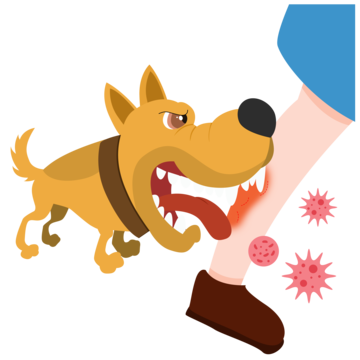Emilee Brewer
Vaccines are vital tools for combating diseases in humans, and it’s no different for dogs! Always consult your vet for what vaccines are recommended, as there are “core” and “noncore” vaccines. Here at Francis Kennels, we require your pet to be current on three vaccines: bordetella, rabies, and distemper. Let’s dive into how vaccines work and what exactly we’re protecting against!
Vaccines work by imitating an infection and engaging the body’s natural defense system. There are three ways the antigen is introduced into the body. One way is with a weakened or dead bacteria or virus. The second way is by the form of a bacterial toxin that has been treated to make it nontoxic, and the third way is made up of genetic materials of the virus or bacteria. Antibodies identify and neutralize foreign substances in the body, such as a virus, and the white blood cells then begin attacking it. White blood cells multiply until the threat is taken care of and then they slowly decrease their numbers until only a few are left to keep watch over everything. While you can still get infected after getting a vaccination, vaccines help to greatly reduce symptoms and significantly lower chances of death.
Bordetella bronchiseptica is one of the bacteria that can cause kennel cough which is just a catch-all term for an upper respiratory infection. This infection causes horrible coughing fits, runny nose, trouble breathing, and lethargy. When the animal coughs or sneezes, little infected droplets shoot out and land on other animals or surfaces. This bacteria can survive on surfaces for hours, days, or months. Because it gets transmitted so easily and lives so long on surfaces, it’s incredibly difficult to get rid of. The Bordetella vaccine is huge if you board your dog, and take them to dog parks or daycare. Being in such close proximity to other pooches makes kennel cough a super spreader. Proper hygiene and sanitization are key when dealing with kennel cough, but even better is to get a vaccine to help prevent it in the first place!
The next vaccine we require is rabies. Rabies is a terrifying disease and can be transmitted to humans. Once symptoms appear, it is 100% fatal, so getting the vaccine is extremely important. Rabies is a viral disease that affects the central nervous system. The rabies virus presents itself in an animal’s saliva, so it’s typically spread through a bite, but can also be spread through scratches. According to WHO, the incubation period for rabies is usually 2-3 months, but it also depends on varying factors such as the location of virus entry and the viral load. Rabies begins with fever, difficulty swallowing, excessive drooling, wobbly gait, and seizures. One of the most well-known symptoms of rabies is foaming at the mouth, but it may not always present itself as “foaming” and could just be lots of drool. As the disease progresses, paralysis sets in and the animal begins losing control of their muscles. This makes swallowing difficult and eventually breathing becomes impossible. Rabies cannot be diagnosed through bloodwork. The only 100% accurate testing is through a brain biopsy. If it’s suspected that your dog has been exposed to rabies, they can get boosters to lessen the chance they contract the virus. However, if symptoms appear, the most humane thing to do is have your dog euthanized. Getting the vaccine and subsequent boosters will help prevent this horrible disease and allow your pet to live a long, healthy life.
The final vaccine needed is distemper. Distemper is a contagious disease that attacks the respiratory, gastrointestinal, and nervous systems of dogs. The virus attacks the cells of the immune system, which then puts the dog at risk of contracting other, more dangerous diseases. Starting with the respiratory and gastrointestinal systems, dogs may experience discharge from the eyes and nose, lethargy, coughing, fever, vomiting, or diarrhea. Then the virus goes after the nervous systems and dogs begin displaying neurological signs such as walking in circles, a head tilt, seizures, lack of coordination, and even partial or complete paralysis. Distemper is spread through bodily fluids such as saliva or urine. There is no cure for distemper and very little can be done to ease the symptoms. It’s mostly fluids to maintain hydration if they have diarrhea and vomiting, and medication to help prevent secondary infections. The vaccine for distemper is usually a combo vaccine called DAPP that protects them from various other diseases as well. DAPP is considered a core vaccine and is recommended that all dogs get it.
Years of research have been done in developing vaccines, and they are extremely important in maintaining your dog's health. They also protect your pup’s friends and keep them safe and healthy too! Contact your vet for any further questions you may have, but let’s all do our part and keep everyone fit as a fiddle!


